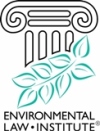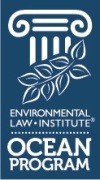About the Environmental Law Institute
 The Environmental Law Institute (ELI) is an internationally recognized independent research and education organization. Since 1969 it has served as a non-partisan source of information about environmental law, policy, and management. ELI fosters innovative, just, and practical law and policy solutions to enable leaders across borders and sectors to make environmental, economic, and social progress. The Institute does this by building the capacity of decision-makers and leaders, researching and analyzing pressing environmental challenges, bringing together diverse groups of people to build shared understanding, and disseminating information online and in print. We do not litigate or lobby.
The Environmental Law Institute (ELI) is an internationally recognized independent research and education organization. Since 1969 it has served as a non-partisan source of information about environmental law, policy, and management. ELI fosters innovative, just, and practical law and policy solutions to enable leaders across borders and sectors to make environmental, economic, and social progress. The Institute does this by building the capacity of decision-makers and leaders, researching and analyzing pressing environmental challenges, bringing together diverse groups of people to build shared understanding, and disseminating information online and in print. We do not litigate or lobby.
About ELI’s Ocean Program

The ocean acts as a critical life-support system for the planet and its people, yet human activity threatens it and the myriad services it provides. The Ocean Program strives to counter this by promoting smart and effective ocean conservation decisions and designing place-based and practical solutions.
ELI’s Ocean Program supports ocean and coastal management systems that are based on local priorities, inclusive and effective processes, and best available information. The Program focuses on supporting regional ocean management, achieving sustainable fisheries and aquaculture, and creating effective frameworks to managed ocean industry and energy. Visit the Ocean Program online to learn more about our ocean and coastal projects.
Our Work on Sustainable Fisheries & Aquaculture
Seafood comprises at least 15 percent of the average animal protein intake for more than three billion people, and is the primary protein source in many areas of the developing world. But due to overfishing, destructive fishing practices, environmental changes, and other stressors, the world’s wild fish stocks are suffering. Overall, 80 percent of the world’s stocks are either fully exploited or overexploited, even as increased population and economic growth increase the global demand for seafood.
This demand has supported tremendous growth in aquaculture production, which now contributes half of the fish consumed globally. Expansion of the aquaculture industry has not come without negative consequences, such as the sustainability of fish feed, competition for scarce freshwater resources, escapes, and pollution.
Through its Ocean Program and International Programs, ELI works to develop legal and policy frameworks that address these myriad challenges and that support the sustainable management of wild and farmed fish and shellfish resources.
